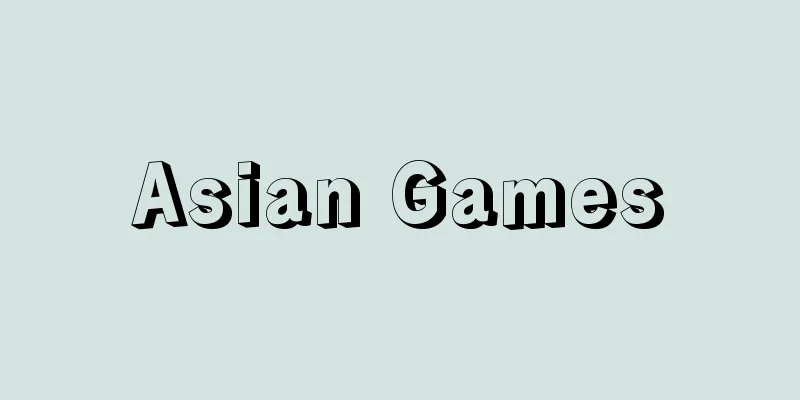Asian Games

|
This sporting event was created after the Second World War with the aim of promoting friendship and peace among Asian countries. Its origins lie in the prewar Far Eastern Championship Games and the West Asian Games. The Asian Games Federation (AGF) was established in 1949 at the suggestion of Guru Dutt Sondhi (India, 1890-1966), who was then a member of the International Olympic Committee (IOC). Since 1986, the Olympic Council of Asia (OCA), which was officially established in 1982, has been organizing the event, and all events are held in accordance with the Olympic spirit, with the support of the IOC. With the motto "Ever Onward," the Olympic flag is also raised in the main stadium of the event, alongside the Asian Games flag. The Olympic flag indicates that the event has the character of an Olympic regional event. Initially, only the Summer Games were held, but after the 9th New Delhi Games (India) in 1982, the Japanese Olympic Committee (JOC) proposed to the OCA that they host a Winter Games, and the first Winter Games were held in Sapporo in 1986. As of 2020, the number of OCA member countries and regions is 45. [Choo Fukagawa and Toshio Nakanishi, January 21, 2021] Summer TournamentThe first tournament was held in New Delhi in 1951. Approximately 500 athletes and officials from 11 countries participated: Afghanistan, Myanmar (then Burma), India, the Philippines, Sri Lanka (then Ceylon), Indonesia, Nepal, Thailand, Singapore, Iran, and Japan. Six events were held: athletics, swimming, soccer, basketball, weightlifting, and cycling. The second tournament was held in Manila, Philippines in 1954, and it was decided to hold the tournament every four years, in between Olympic Games. The third tournament was held in Tokyo, which had been planning to host the Olympics, and in 1958 20 countries participated, with 13 events held at the newly renovated National Stadium. The fourth tournament in Jakarta in 1962 was embroiled in a dispute when the host country, Indonesia, refused to allow Taiwan (now affiliated under the name Chinese Taipei) and Israel to participate for political and religious reasons. The IOC stated that it could not recognize an event as an official event if eligible countries could not participate, and the International Association of Athletics Federations (now World Athletics) and the International Weightlifting Federation agreed. The weightlifting event was canceled, and the IOC also suspended the host country. However, in November of the following year, 1963, Indonesia formed a separate organization called GANEFO (Emerging Nations Games) to hold a competition to rival the Asian Games, but GANEFO was dissolved due to the downfall of President Sukarno, and Indonesia was allowed back into the IOC, restoring stability to the Asian sports world. The fifth (1966) was held peacefully in Bangkok, Thailand. The sixth (1970) was scheduled to be held in Seoul, but due to domestic circumstances in Korea, it was cancelled and the event was held in Bangkok again. The seventh (1974) was held in Tehran, Iran, and China's first participation, which had been absent from the international sports world since 1958, attracted attention. The number of participating athletes also swelled to about 2,700 from 25 countries. The Asian Games had always felt like a one-man show for Japan, but this time, the performance of China, which was participating for the first time, and the local Iranian athletes stood out and became a hot topic. The eighth (1978) was decided to be held in Singapore, but then Singapore cancelled due to financial reasons, and Islamabad, Pakistan, took over, but then also cancelled due to domestic circumstances. In the end, the participating countries were required to pay their share of the costs, and the event was held in Bangkok for the third time. The ninth Olympics (1982) was held in New Delhi, and Japan, which had led the way in the number of gold medals won since the first Olympics, fell to second place behind China, and thereafter China reigned as the "leader of Asia." At the 10th Olympics (1986) in Seoul, South Korea, which was due to host the Olympics two years later, came in first in the total number of medals. In the men's hammer throw, Shigenobu Murofushi (1945-) won his fifth consecutive title since the 6th Olympics. From this tournament onwards, the Olympics were hosted by the OCA, but the number of events continued to increase, and the Olympics continued to grow. The 11th Olympics (1990) was held in Beijing, and Iraq was suspended from the OCA due to the Gulf War and was unable to participate, while Taiwan, under the name Chinese Taipei, returned for the first time in 20 years since the 6th Olympics. The 12th Olympics (1994) was held in Hiroshima, outside the capital, for the first time, and five former Soviet countries, including Kazakhstan, participated for the first time. The 13th (1998) was held in Bangkok for the fourth time, and in the men's track and field event, Koji Ito (1970-) won the triple crown in the short distance, setting an Asian record of 10.00 seconds in the 100m semi-finals. The 14th (2002) was held in Busan, South Korea, and at the opening ceremony, South Korea and North Korea (Democratic People's Republic of Korea) marched together in a joint North-South parade, following on from the 2000 Sydney Olympics. In the men's 200m breaststroke final, Kosuke Kitajima won with a new world record of 2 minutes 9.97 seconds. The 15th Olympics (2006) was held in Doha, Qatar, the first time an Arab country hosted the Olympics, and Iraq, which had been suspended, returned for the first time in 20 years. The 16th Olympics (2010) was held in Guangzhou, China, and 476 events in 42 sports were held, the most ever, exceeding the number of events held in the Olympics, with China winning 199 gold medals, the most ever. The 17th Olympics (2014) was held in Incheon, South Korea, with 38 sports, four fewer than the previous Olympics, under the theme of simplicity and efficiency. The 18th Olympics was scheduled to be held in Hanoi, Vietnam, one year before the Olympics, but was canceled due to financial difficulties of the government. Indonesia took over the Olympics in 2018 due to the presidential election, and for the first time, the Olympics were held in two cities, Jakarta and Palembang. In women's swimming, Ikee Rikako (2000-) won six gold medals. The 19th event (2022) will be held in Hangzhou, China, and the 20th event (2026) will be co-hosted by Aichi Prefecture and Nagoya City. [Choo Fukagawa and Toshio Nakanishi, January 21, 2021] Winter GamesThe first tournament was held in Sapporo in 1986. Approximately 290 athletes and 140 officials from seven countries and regions, including China, North Korea, Hong Kong, India, South Korea, Mongolia, and Japan, participated in the four events of skiing (alpine and cross-country), skating (speed and figure), ice hockey, and biathlon, as well as a demonstration ski large hill jump. The second tournament (1990) was held in Sapporo again after India withdrew from hosting the event. The third tournament was delayed by one year because the Winter Lillehammer Winter Games (Norway) were moved to 1994 due to the separation of the Winter and Summer Olympic Games, but the Winter Asian Games were held in Harbin, China in 1996 after North Korea withdrew from hosting the games. The fourth tournament (1999) was held in Gangwon Province, South Korea, and the fifth tournament (2003) was held in Aomori, with five events including curling. The 6th (2007) was held in Changchun, China, and the 7th (2011) in Astana and Almaty, Kazakhstan, but since then there have been few cities with well-equipped sports facilities, and it has been difficult to select a host city. Finally, six years later in 2017, the 8th was held in Sapporo for the third time (speed skating was held in Obihiro), with 1,164 athletes from 32 countries and regions participating, including guest appearances from Australia and New Zealand. The host city for the 9th (2021) has yet to be decided. In the first Olympics (Sapporo), Japan far outshone the other countries with 29 gold medals, 23 silver medals, and 6 bronze medals out of 35 events in four sports, but Asian countries have also rapidly grown in strength, and with the exception of the fourth Olympics in South Korea (where China came in first), the host country has always come first in both the number of gold medals and the total number of medals. In the eighth Olympics (Sapporo), where 64 events in five sports were held, Japan won a record 74 medals with 27 gold medals, 21 silver medals, and 26 bronze medals. [Toshio Nakanishi January 21, 2021] [References] | |Source: Shogakukan Encyclopedia Nipponica About Encyclopedia Nipponica Information | Legend |
|
第二次世界大戦後、アジア諸国の友好と平和促進を目的として生まれたスポーツ大会。戦前の「極東選手権競技大会」と「西アジア競技会」が母体である。当時国際オリンピック委員会(IOC)委員であったソンディーGuru Dutt Sondhi(インド。1890―1966)の発案で、1949年にアジア競技連盟(AGF)が設立された。1986年からは、1982年に正式に設立されたアジア・オリンピック評議会(OCA)が大会を主催し、競技はIOC協賛のもと、すべてオリンピック精神に即して行われる。「Ever Onward(限りない前進)」をモットーに、大会メインスタジアムにはアジア競技大会旗と並んで、オリンピックの五輪旗も掲げられる。五輪旗は、この大会がオリンピック地域大会としての性格をもつことを示している。当初は夏季大会のみが開催されたが、1982年の第9回ニュー・デリー大会(インド)後に、日本オリンピック委員会(JOC)がOCAに冬季大会の開催を提唱し、1986年(昭和61)に札幌で第1回の冬季大会が開催された。OCA加盟数は2020年の時点で45か国・地域である。 [深川長郎・中西利夫 2021年1月21日] 夏季大会第1回大会は1951年にニュー・デリーで開催。アフガニスタン、ミャンマー(当時ビルマ)、インド、フィリピン、スリランカ(当時セイロン)、インドネシア、ネパール、タイ、シンガポール、イラン、日本の11か国、約500人の選手、役員が参加。陸上、水泳、サッカー、バスケットボール、ウエイトリフティング、自転車の6競技が行われた。第2回大会は1954年フィリピンのマニラで開かれ、以後4年に1回、オリンピックの中間年開催と決まった。第3回大会は、オリンピック招致を意図していた東京で開催され、1958年に20か国が参加し、新装の国立競技場を中心に、13競技が展開された。1962年の第4回ジャカルタ大会は、主催国インドネシアが政治的、宗教的理由から台湾(現在はチャイニーズ・タイペイ=中華台北の名のもとに加盟)とイスラエルの参加を拒否したことから紛糾した。IOCは参加資格がある国が参加できない大会は正式な大会として認めることはできないと表明し、国際陸上競技連盟(現在のワールドアスレティックス〈世界陸連〉)と国際ウエイトリフティング連盟が同調。ウエイトリフティングは競技が中止となり、IOCも開催国に資格停止処分を宣した。しかし、インドネシアは翌1963年11月、別にガネフォ(GANEFO、新興国競技大会)を結成して、アジア大会に対抗する大会を開催したが、スカルノ大統領の失脚などによりガネフォは消滅、インドネシアはIOC復権が認められ、アジアのスポーツ界は安定を取り戻した。 第5回(1966)はタイのバンコクで平穏裏に開催。第6回(1970)はソウル開催を決定していたが、韓国の国内事情により返上、ふたたびバンコクで開催された。第7回(1974)はイランのテヘランで開かれ、この大会では1958年以来国際スポーツ界から遠ざかっていた中国の初参加が注目を浴びた。参加選手も25か国約2700人に膨れ上がった。アジア大会といえば日本のひとり舞台の感があったが、この大会では、初参加中国と地元イラン勢の活躍が目だち話題となった。第8回(1978)はシンガポール開催に決定後、同国の財政上の理由で返上、パキスタンのイスラマバードが引き受けたあと、これも国内事情から返上、結局、参加国が分担金負担ということで、三たびバンコクで開催された。第9回(1982)はニュー・デリーで行われ、金メダル獲得数で第1回からトップだった日本は、中国に次ぐ2位に落ち、以降は中国が「アジアの盟主」に君臨した。 第10回(1986)のソウルは、2年後にオリンピック開催を控えた韓国がメダル総数で1位。陸上男子ハンマー投げでは室伏重信(むろふししげのぶ)(1945― )が第6回大会から5連覇を達成した。この大会からOCAの主催となったが、競技数はさらに増え続け、肥大化の一途をたどることになる。第11回(1990)は北京(ペキン)で開かれ、イラクが湾岸戦争の影響でOCAから資格停止で不参加、台湾が中華台北の名称で第6回大会以来、20年ぶりに復帰した。第12回(1994)は初めて首都以外の広島で開催され、カザフスタンなど旧ソ連の5か国が初参加。第13回(1998)はバンコクで四度目の開催となり、陸上男子では伊東浩司(いとうこうじ)(1970― )が100メートル準決勝でアジア新記録の10秒00を記録するなど短距離三冠を獲得した。第14回(2002)は韓国の釜山(プサン)で開催され、開会式では韓国と北朝鮮(朝鮮民主主義人民共和国)が、2000年シドニー・オリンピックに続いて南北合同行進。競泳男子200メートル平泳ぎ決勝では北島康介が2分9秒97の世界新記録で優勝した。 第15回(2006)はアラブ諸国で初めてとなるカタールのドーハで行われ、資格停止処分を受けていたイラクが20年ぶりに復帰。第16回(2010)は中国の広州(こうしゅう)で開催され、オリンピックを上回る史上最多の42競技476種目を実施、中国が過去最多の金メダル199個を獲得した。第17回(2014)は韓国の仁川(じんせん)で簡素・効率化をテーマに前回より4減の38競技に圧縮して開催。第18回は開催年をオリンピックの中間年から1年前に移行してベトナムのハノイで予定されていたが、政府の財政難で返上。インドネシアが大統領選の関係で2018年に前倒しで引き受け、初めてジャカルタとパレンバンの2都市開催となった。競泳女子では池江璃花子(いけえりかこ)(2000― )が6冠に輝いた。 第19回(2022)は中国の杭州(こうしゅう)、第20回(2026)は愛知県と名古屋市の共催で開かれる。 [深川長郎・中西利夫 2021年1月21日] 冬季大会第1回大会は1986年に札幌で開催。中国、北朝鮮、香港(ホンコン)、インド、韓国、モンゴル、日本の7か国・地域から選手約290人と役員約140人が参加し、スキー(アルペン、クロスカントリー)、スケート(スピード、フィギュア)、アイスホッケー、バイアスロンの4競技とデモンストレーションのスキー・ラージヒルジャンプが実施された。第2回(1990)はインドの開催返上で、ふたたび札幌で開催。第3回は、オリンピックの冬季大会と夏季大会の分離で冬季リレハンメル大会(ノルウェー)が1994年に変更されたため、冬季アジア大会は1年遅らせたが、北朝鮮の開催返上により、1996年に中国のハルビンで開かれた。第4回(1999)は韓国の江原道(こうげんどう)、第5回(2003)は青森でカーリングを加えた5競技が実施された。第6回(2007)は中国の長春(ちょうしゅん)、第7回(2011)はカザフスタンのアスタナとアルマトイで開かれたが、その後は競技施設の整った都市が少なく、開催地選定に難航。ようやく6年後の2017年に第8回が三度目となる札幌で開催(スピードスケートは帯広(おびひろ)で実施)され、ゲスト参加のオーストラリア、ニュージーランドを含めて最多32か国・地域から1164選手が参加した。第9回(2021)の開催地は未定。 メダル争いは第1回(札幌)こそ、日本が4競技35種目中、金29個、銀23個、銅6個を獲得して他国を大きく引き離したが、アジア諸国も急速に力をつけ、韓国での第4回(中国が1位)を除いては、開催国が金メダル数、メダル総数ともに1位。日本は5競技64種目が行われた第8回(札幌)では金27個、銀21個、銅26個で過去最多のメダル74個を獲得した。 [中西利夫 2021年1月21日] [参照項目] | |出典 小学館 日本大百科全書(ニッポニカ)日本大百科全書(ニッポニカ)について 情報 | 凡例 |
<<: Institute of Developing Economies
>>: Asian Development Bank (English name)
Recommend
Idemitsu Tanker Co., Ltd.
…In terms of crude oil procurement, the company t...
Children's Hero Stories
A long colloquial novel from the Qing Dynasty in ...
Regnault, HV (English spelling) RegnaultHV
…During this time, he had already published about...
Fauna
…He was originally a forest god, and was sometime...
frog spit
...The bubbles of the larvae are very conspicuous...
Onetmu - Onetmu
…In particular, after his father died in 1651, an...
Carpo (English spelling)
Jupiter's 46th moon. Its orbital inclination t...
Building physical strength - building strength
Intentionally improving physical abilities such as...
Agave - Agave
Also known as the "Fukurin agave." An ev...
Iron hydroxide - Suisancatetsu
[ I ] Iron(II) hydroxide: Fe(OH) 2 (89.86). Obtai...
Sepioidea
…the general term for the living Sepioidea and Te...
Ryutaro Otomo
1912-1985 An actor from the Showa era. Born June ...
Boisserée, S.
...He himself later leaned towards classicism, bu...
Yue people - Etsuzoku (English spelling) Yuè zú
A maritime ethnic group that spread from Zhejiang ...
Dhananjaya (English spelling)
The Natyaśāstra (3rd-4th century) by Bharata is t...









